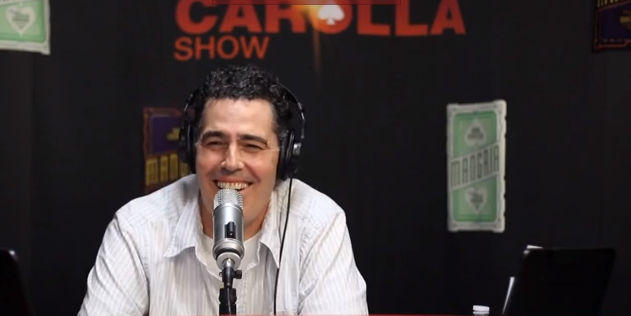Adam Carolla settles with podcasting patent troll, agrees to ‘quiet period’ | Ars Technica

Carolla doing his podcast, earlier this month.
After more than a year of litigation, podcaster and comedian Adam Carolla has reached a cease-fire with the well-known "patent troll" claiming to hold a patent that covers podcasting.
Carolla was sued for patent infringement in January 2013. He responded by fighting back, raising almost $500,000 in a crowd-funded campaign. The parties had a trial set for next month in East Texas.
Personal Audio LLC, the patent company, also sued TV networks CBS, NBC, and Fox over some of their Internet video-on-demand offerings, since it believes its patent covers some types of Internet "episodic content." The TV companies are continuing to litigate.
Carolla and Personal Audio filed joint motion to dismiss (PDF) on Friday, and it was approved by the judge today. The settlement terms aren't being revealed—yet. Both sides have agreed to a "quiet period" that will last through September 30.
However, in this case, it's possible to make educated guesses about some aspects of the settlement. First of all, Carolla likely paid Personal Audio nothing. The patent holding company already made clear last month that it was willing to walk away from this lawsuit without getting paid. But it may have sought other conditions that were still in dispute. Whatever those disagreements were, they have apparently now been resolved.
Carolla's lawyers actually asked for Personal Audio to be sanctioned for its July press release, saying it had violated the terms of mediation. The motion they filed is under seal, but it was discussed at an August 12 hearing.
Both the lawsuit and Carolla's counterclaims have been dropped "without prejudice," meaning they could be re-filed.
In a post analyzing the "good, bad, and ugly" of this patent settlement, EFF attorney Daniel Nazer points out that in the course of litigation, Personal Audio figured out that Carolla actually didn't make that much money off his podcasting. Personal Audio said it was backing away because it didn't want "to litigate over the smaller amounts of money at issue."
"If suing him makes no economic sense, then it makes no sense to sue any podcaster," notes Nazer. "We hope that Personal Audio’s public statements on this issue mean that it has truly abandoned threatening and suing podcasters."
Of course, that's assuming that Personal Audio continues to make economically rational decisions and ignore the "little guys." But in the past, it has sent demand letters to small podcasters—that's part of the reason it got EFF's attention in the first place. Based on what's public today, podcasters have no guarantee they won't be threatened or sued over Personal Audio patents in the future.
Don't feel inspired by the result that podcasters are just too poor to bother suing? Hold tight, because that was the good news. After causing Carolla massive legal fees, Personal Audio is going to walk away with no penalty. It won't have to pay any of those expenses, and it can re-focus on targets it believes will be lucrative. Its patents are intact, and they are dangerous. Personal Audio is one of the few patent trolls that has shown it can push through to a trial and succeed in that environment—it even beat Apple in a dispute related to a different patent said to cover playlists.
The "ugly," of course, is that even with Carolla's stature and ability to build a $500,000 war chest, it wasn't enough. According to his CFO Mike August, who spoke to Ars before the settlement deal was reached, Carolla still had paid substantial out-of-pocket legal expenses related to the case. The trial itself would have been another several hundred thousand.
It isn't that unusual for a patent holding company to drop its case right before trial. As Nazer notes in his post, another infamous troll (Lodsys) pulled that trick to avoid a trial against Kaspersky Lab. Another company determined to fight trolls, Newegg, has made a point of always insisting on getting costs and fees from patent trolls. But it's still hard to get fees in patent cases, and the fee fight itself can be bruising. "Carolla’s team likely made the calculation that fees would be a long shot," writes Nazer.
As for the unusual stipulation that there be a "quiet period," it seems designed to stop the parties from bashing each other in public, while still letting lawyers and possibly witnesses for Carolla's side help out with the TV networks' case. It reads:
With the exception of the press release announcing the settlement that has been approved by the Court, Personal Audio, Lotzi and the Partnership shall not make any public statements, issue any press releases or otherwise issue public comments (e.g., by providing an interview to a reporter) concerning this litigation from August 15, 2014 up to and including September 30, 2014 (“Quiet Period”). In response to any media inquiries received during the Quiet Period, it shall be permissible for the parties to either: (1) refer parties to this motion and/or any order granting this motion; or (2) say “no comment.”
...
Further, nothing in this motion shall be construed to prevent either any party or witness from testifying in a deposition, trial or other judicial proceeding or any attorney associated with a party from referring to the litigation in any deposition, trial or other judicial proceeding (e.g., in an opening statement, or other argument).
EFF is also challenging the Personal Audio patent in an "inter partes review" being conducted at the US Patent Office. The case against the television broadcasters is likely to go to trial before that review is completed, however.